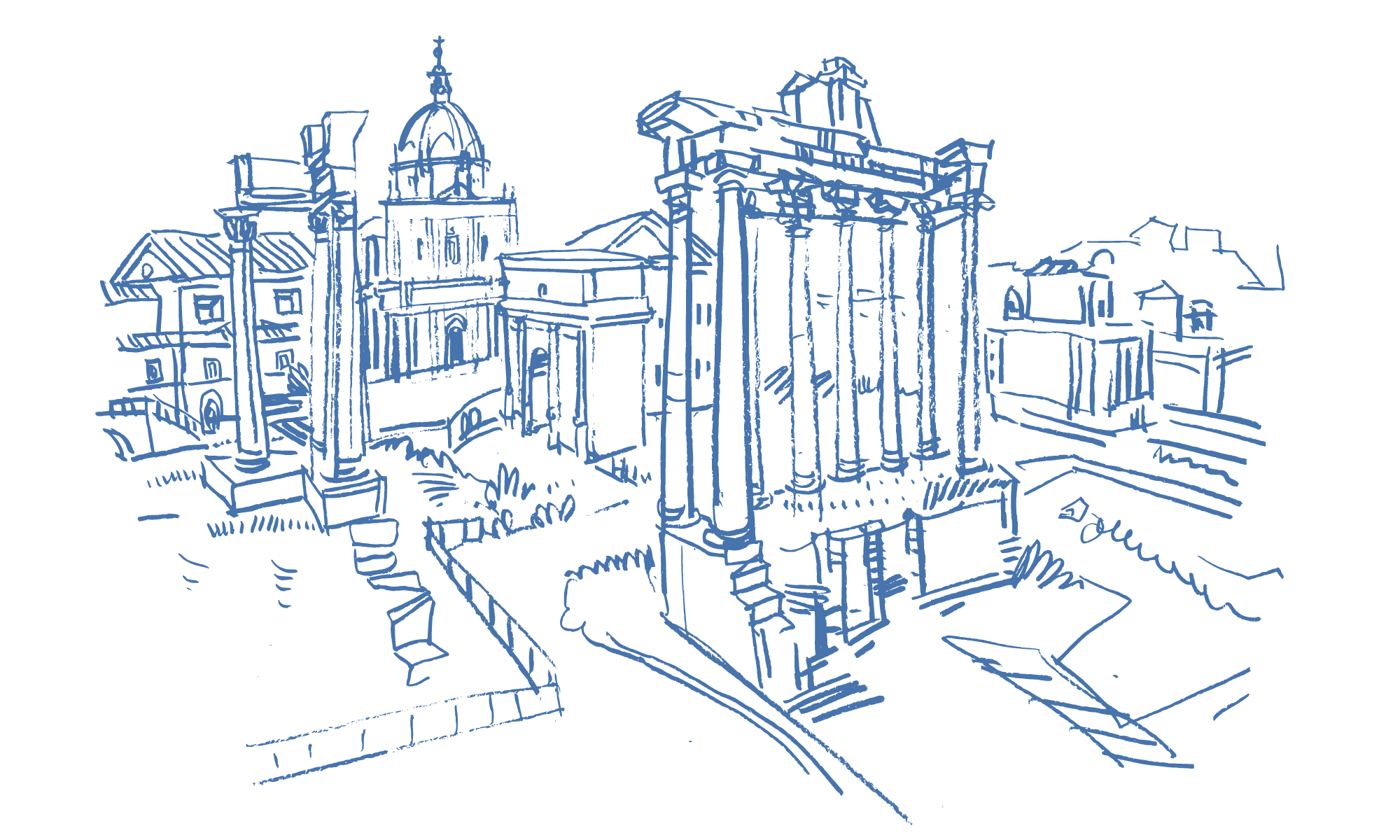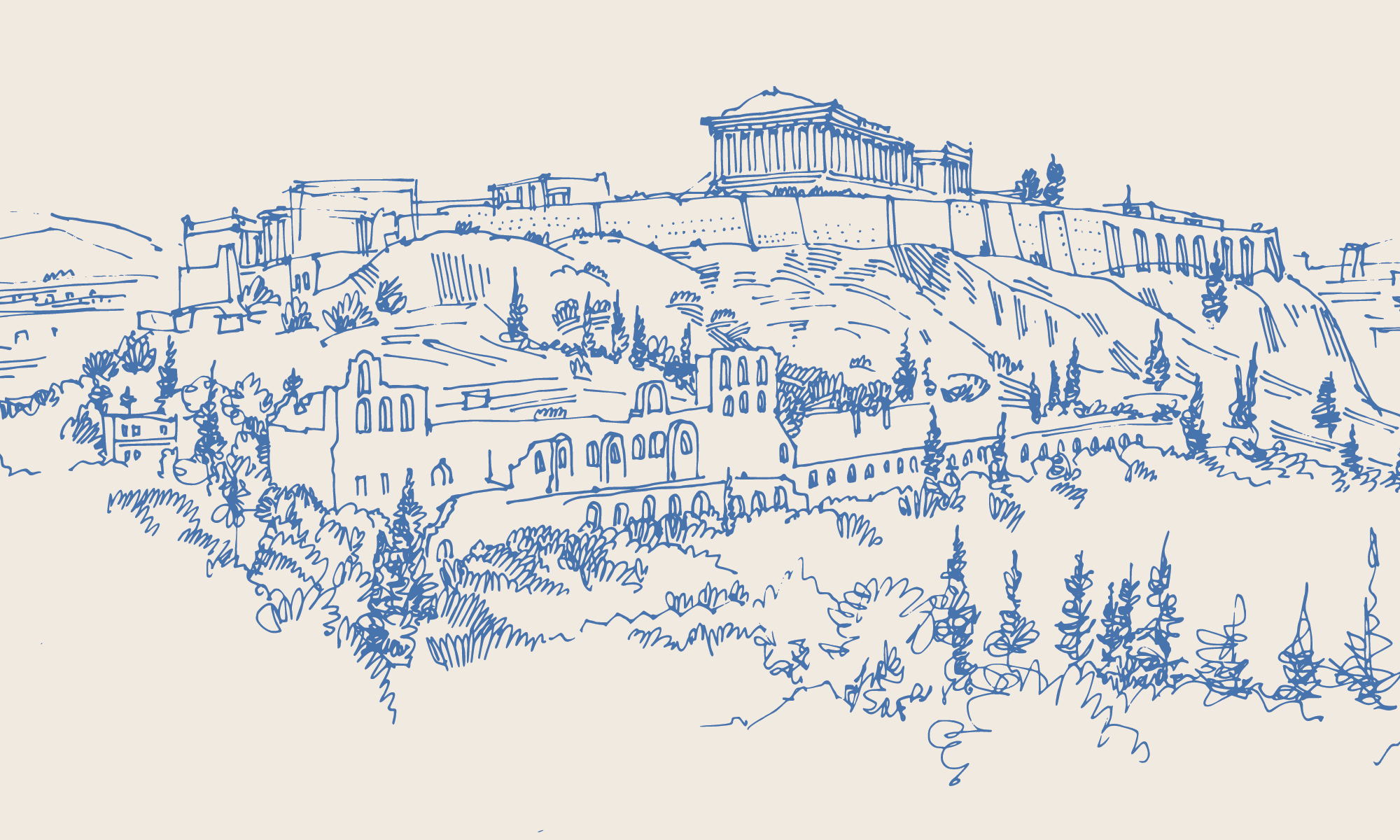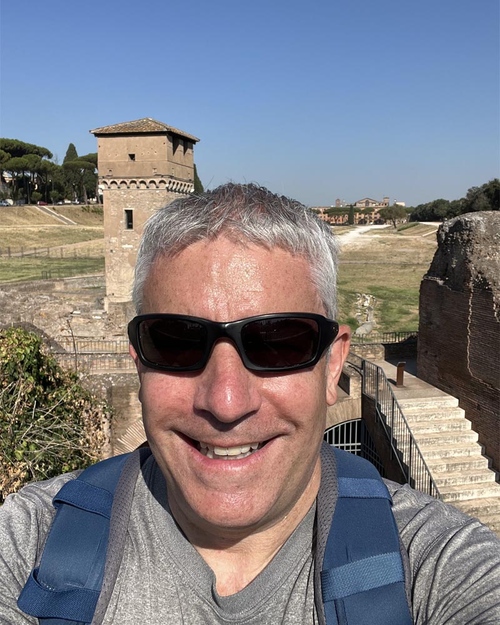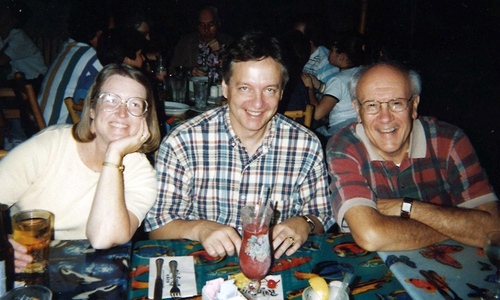Alex Chloros ’94 trains his business analysts at PwC in techniques he learned researching and writing at Denison.
Quinn Griffin ’10 applies skills attained in her Latin classes to her work as an instructional program designer.
Allison Emmerson ’04 unearths new findings in Pompeii using methods she first learned as a classics major.
How does what could arguably be considered the oldest curricula in Western education break Prometheus’ chain and metamorphose into a discipline both poetic and practical? Denison answers the question through the stories of the people who know best: classics faculty and alums.
The only true wisdom is in knowing you know nothing.
–Socrates
Classics is the name used in academic circles to denote the study of ancient Greek and Roman history, culture, languages, and literatures. Denison students continue to be drawn to the classics even though “our stuff is thousands of years old,” says professor Tim Hofmeister.
They might be curious to learn more about the mythological world of the popular Percy Jackson and the Olympians series. They might be intrigued by their Latin-class samplings of Cicero and Ovid or engrossed by democratic political discourse.
In most cases, first-time classics students are unaware they’ve only skimmed the surface of a subject that has ignited scholars since the fall of the Roman Empire. After “sailing” those famed wine-dark Mediterranean seas with Denison faculty, many, like Marc Sterne ’91, declare, “Being a classics major was the best thing I ever did.”
This year, Sterne is traveling to Rome for the first time. He’s elated at the prospect of visiting many of the ancient sites he’s been reading about since he landed in Hofmeister’s Age of Caesar class more than 30 years ago.
Sterne had planned to major in English until he encountered classical Greece and Rome. The experience was akin to drinking from a cup of ambrosia; every sip offered a dazzling new insight. Trying to wrap his head around it all, Sterne approached his professor. “Tim explained the classics are ‘language, art, literature, theater, history, and architecture, everything rolled into one.’ I was all in.”
Enthusiasm like Sterne’s reflects the genuine enjoyment and commitment Denison faculty have for their discipline and their students.
For several weeks each summer, Hofmeister lives in Greece. He knows the places, food, and culture intimately, and he generously sprinkles his observations into discussions of Homer’s Odyssey. He also relishes new opportunities to teach ancient subjects. Recently, his students compared and contrasted Homer’s characters by reading Circe, Madeline Miller’s best-selling novel.
Likewise, professor Rebecca Futo Kennedy can also be found pursuing her scholarship while living on the Aegean Sea during the summer, where she frequently guides classics majors on research projects. Back on The Hill, she offers fresh ways for students to connect with classical materials.
During election years, they learn the cornerstones of ancient Athenian democracy and its influence on the modern world by researching and writing documents to create and support the mechanisms of a new, ideal democracy. Last spring, her Greek language class completed their translations of The Bacchae by Euripides, then staged their own performance of the 2,500-year-old play.
In classes launching this academic year, students will learn about shopping and markets in the pre-modern world. They’ll study the Roman economy via the archaeological remains of cities and visit a 3D virtual reconstruction of Roman shops.
Travel can be a potent component of the curriculum. Many classics students have journeyed to the Mediterranean on faculty-led credited summer programs. “It’s like riding a time machine, and the landscape becomes your teacher,” Hofmeister says.
Where your talents and the needs of the world cross, there lies your vocation.
— Aristotle
It’s also the first time out of the country for many students. Stephen Kershner ’97 recalls his own eye-opening trip to Greece with his Denison professors, “They didn’t just teach us about architecture,” he says. “They took us into the country and showed us the way a lot of people live. It was a whole new way to see the world.”
As students contemplate their postgraduate steps, faculty advisors offer invaluable advice and support. The results are often life-changing. With fulfilling careers across industries and professions, they fracture the perception that these majors struggle to find lucrative work.
Kershner always remembered a particular career-planning conversation with his professor, Garrett Jacobsen. When Kershner, only half-joking, said he wanted to be the next Indiana Jones, “Garrett said he could get me where I wanted to go.”
Over the next four years, Jacobsen equipped Kershner with the knowledge and skills to shine through the rigors of graduate school. Though Kershner isn’t fighting evil archaeologists today, he is a professor at Austin Peay State University, teaching students ancient Greek and Latin languages and literature — just like his hero, Indy.
Former staff Cookie Sunkle and emeriti professors Garrett Jacobsen and Tony Lisska enjoy a libation in Orlando, Florida, at a meeting for college honors programs
“What was really special about Garrett is that I wasn’t the only student he did this for. He saw his job as helping people get where they want to be in life,” says Kershner, who follows Jacobsen’s lead when advising his own students.
As an international student from Greece, classics and political science major Alex Chloros ’94 might have rested on his laurels. “You would expect someone with my background to be well-versed in classics and history,” he says. Nothing was further from the truth.
Ancient history, pardon the pun, might be, Greek to Greeks. A relatively new nation, Greece is younger than the United States, and public school history classes are dominated by the state-approved books that sometimes give a one-sided view of historical events. Ironically, Chloros learned much about his own country’s history while studying at a liberal arts college in central Ohio.
Taking classes with Hofmeister and Jacobsen and working on his senior research project on the Republican army also taught Chloros the importance of gathering information from different sources. “Learning how to compare, contrast, and interpret the sources gave me a completely new experience and knowledge base,” he says.
Chloros went on to earn his master’s in international relations from George Washington University and returned home to Greece. Today, he is a director with PwC in Athens, offering consulting advice to local and regional public sector entities. When the associates under his direction write a market analysis, he ensures they research properly by comparing original and available sources. “You can’t rely on one point of view and come to a correct interpretation of the market,” he says.
When Simone Drake ’97 told her parents she was majoring in classical studies, her mother had a typical response: “What kind of job can you get with that?”
Today, Drake is a professor at Ohio State University, where she earned master’s degrees in English and Black studies. Drake also earned a master’s of law from the Moritz College of Law at Ohio State University and a doctorate in English from the University of Maryland.
Drake, who assigns her argumentative teenage children mandatory readings of the Allegory of the Cave from Plato’s Republic, says the knowledge she gained as a classics major was definitely a throughline in her studies and career.
Learning the rules of Greek declensions demystified English sentence structure. The Sophists’ rhetoric-based arguments prepared her for law school. Drake continues to lean on those long-ago lessons when teaching her own students how to work through big questions. “Have your experiences and values,” she says, “but develop arguments to support them based on reason and logic.”

In her career as an instructional program designer, Quinn Griffin ’10 must speedily master a kaleidoscope of topics, bouncing from welding to spinal surgery to financial fraud detection.
She finds the challenges similar to those she conquered while researching academic papers across the classical era’s 13-century timeframe. Ancient languages evolved just as quickly as modern languages do today, and each generation developed its own lingo and style. Griffin, who earned a Ph.D. in classics from Ohio State University, was constantly learning new words and colloquialisms. That skill is foundational to her profession.
“To communicate effectively, I have to get on top of all these topics and understand new vocabularies quickly,” says Griffin, who also sings in a jazz ensemble and is writing a novel about a 17th century nun fascinated by Greek mythology. “My research background is a huge advantage.”
Spouses Allison and Nate Emmerson, classics majors from the Class of 2004, say their classical education taught them to critically engage with pieces of text and rubble before drawing theories and conclusions.
They employ that knowledge in very different careers. Nate is a senior technical specialist working in the construction field. He evaluates information daily and forms the conclusions that best support his company’s goals.
Allison is an associate professor of classical studies at Tulane University and the director of an international archaeological project in Pompeii. As an archaeologist, she’s driven to approach the findings with an open mind.
The couple fondly recall their first visit to Rome with professor Jacobsen in 2003. They return frequently, spending summers in Italy, mostly at Allison’s Pompeii project. “We still mark our passage around the Eternal City referencing that trip,” Nate says. “We ate at this restaurant or stayed at that hotel.”
“None of this would have happened without Denison and Garrett Jacobsen,” Allison says.
Marc Sterne’s broadcasting career with the Tony Kornheiser Show, both as co-producer and as the beloved character “Nigel the British guy,” is also rooted in his liberal arts education.
In addition to the “voracious reading habit” he developed as a classics major, Sterne enjoyed acting and watching baseball at Denison. He was able to lean on those skills when launching his radio career covering the Olympics — even though his only previous on-air experience was “doing a William Shatner bit on a friend’s WDUB show.”
Sterne moved on to enjoy a stint as a morning show producer for the Billy Bush Show before joining former Washington Post journalist Kornheiser more than 20 years ago. “It’s a crazy work schedule and a really rewarding career,” Sterne says.
While his insatiable reading appetite provides fodder for on-air patter about everything from sleep hygiene to sports, it’s the impact the classics have made on him outside his career that matters most to Sterne.
He credits that long-ago discussion with his professor with starting him on the road to one of the greatest joys in his life: learning something purely for the sake of knowledge.
“That conversation changed my life,” he says. “It lit a passion in me that has burned all these years.”




